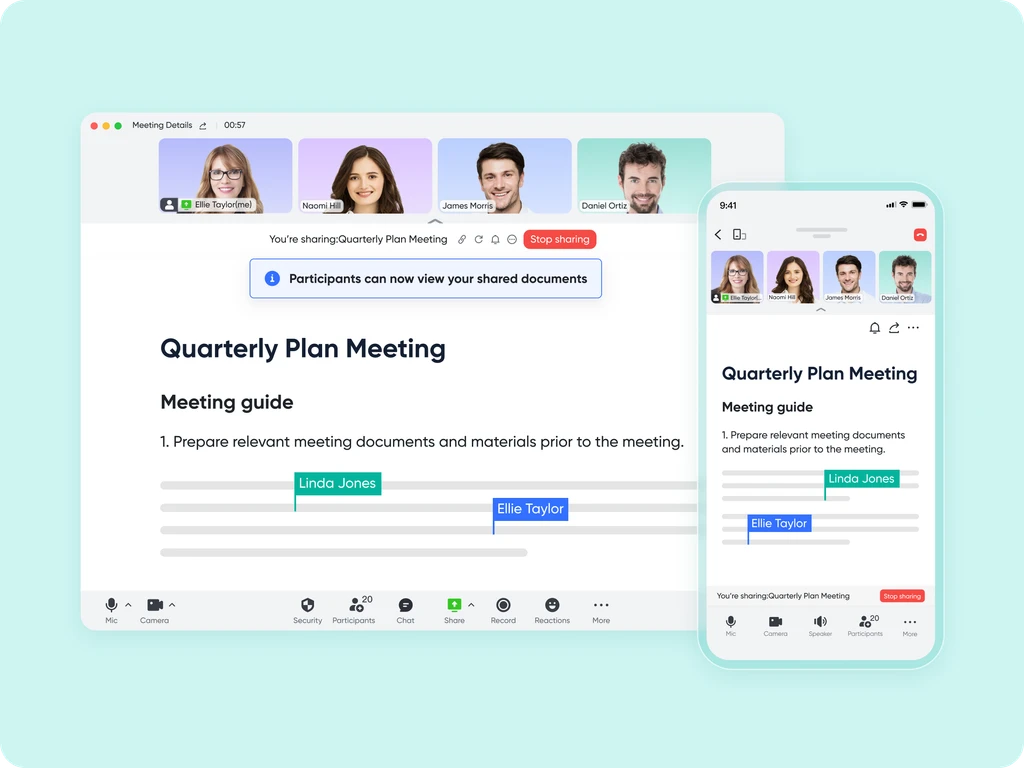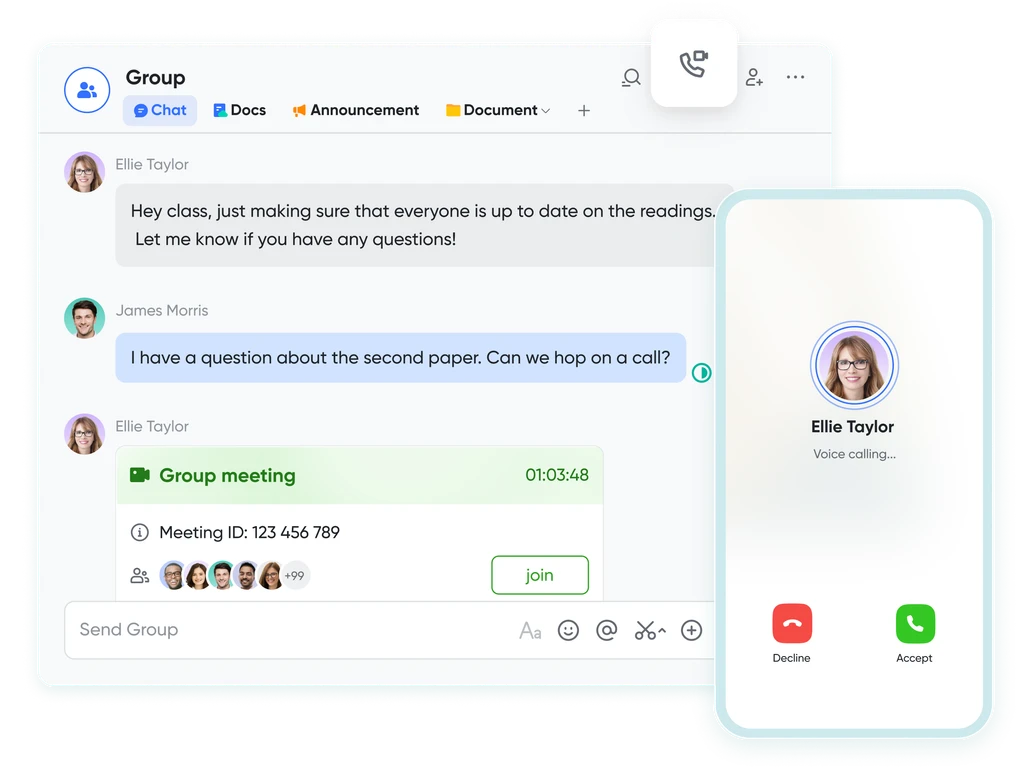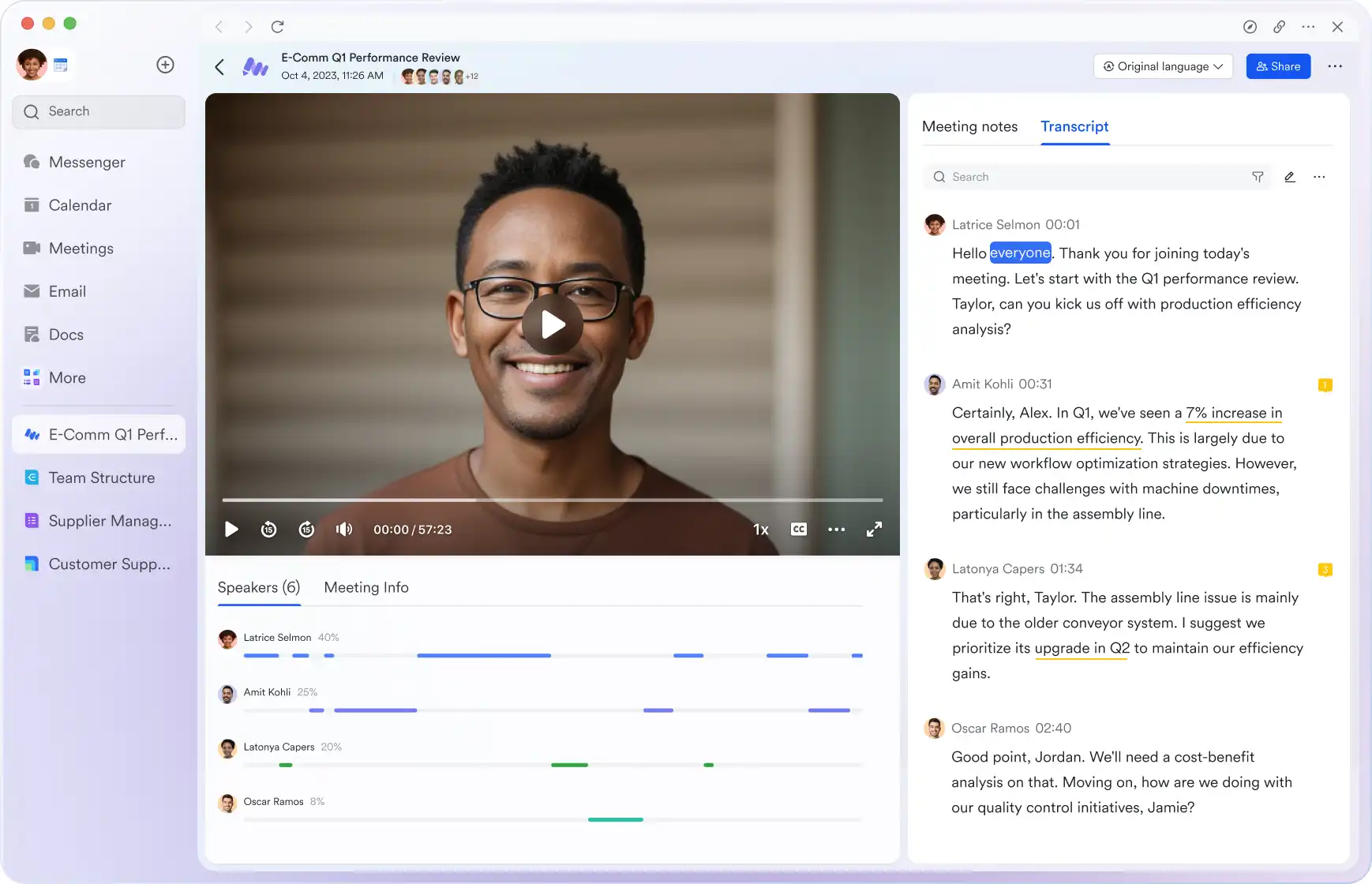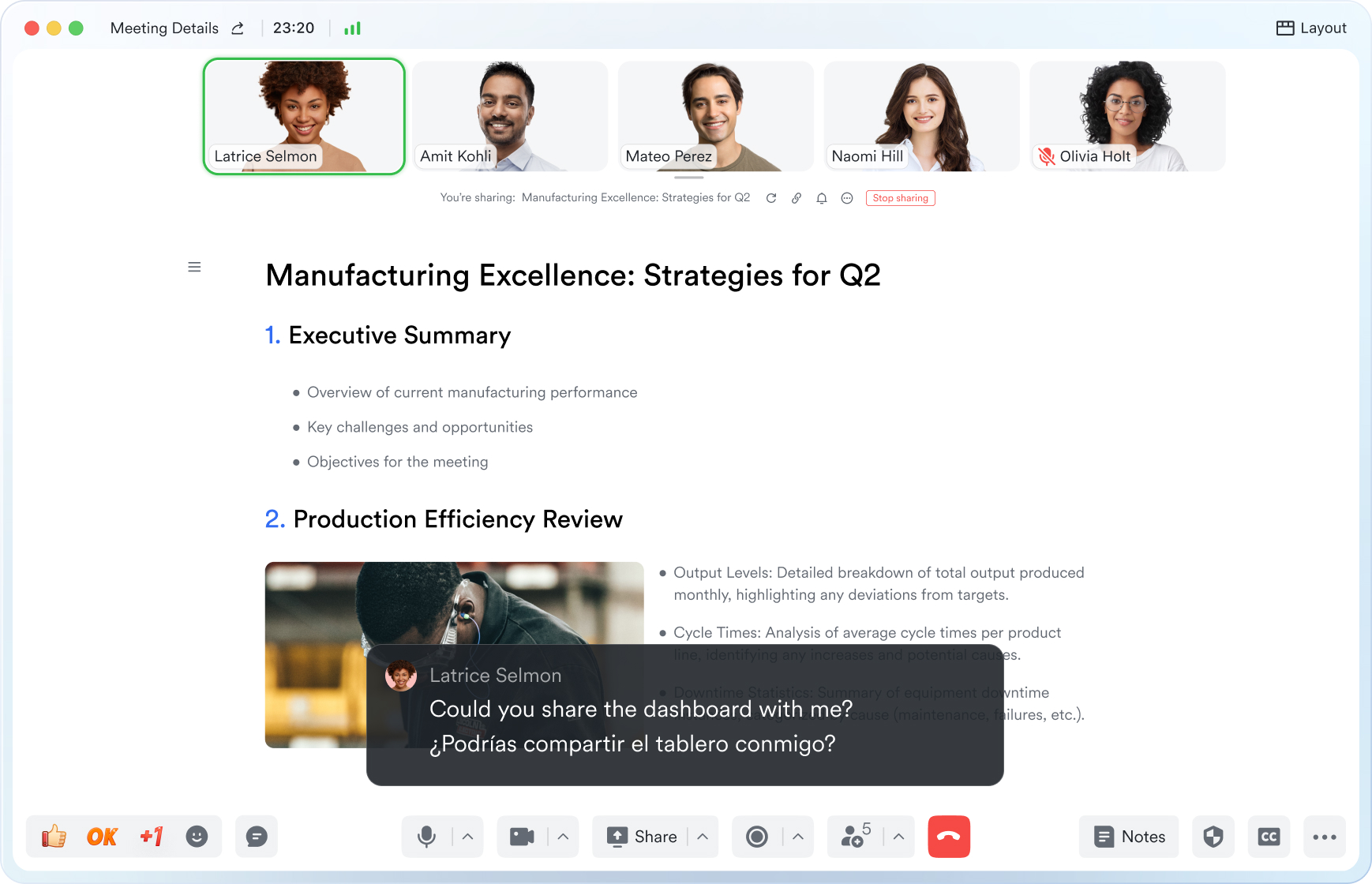Social Media Strategy Meeting
This guide will walk you through the essential elements of use social media strategy meeting to keep your attendees aligned and engaged.
Try Lark for Free
Navigating the ever-evolving realm of social media necessitates strategic and well-coordinated efforts. Central to these efforts are social media strategy meetings, which serve as crucial platforms for devising, refining, and executing dynamic digital marketing tactics. This article is dedicated to unraveling the intricacies of hosting impactful meetings, tailored to drive resonance and success in the continually evolving social media landscape.
Use Lark Meetings to turn meetings into true collaborative experiences.
What is a social media strategy meeting?
A social media strategy meeting serves as a dedicated forum for aligning organizational objectives with targeted digital marketing strategies. It encompasses in-depth discussions regarding content planning, audience engagement, platform optimization, and performance evaluation, all aimed at maximizing the impact of social media initiatives.
Goals of social media strategy meeting
The primary objectives of a successful social media strategy meeting include:
- Alignment: Ensuring that all stakeholders are aligned with the overarching business goals and the role of social media in achieving them.
- Campaign Evaluation: Reflecting on the performance of previous campaigns to derive valuable insights that can inform future strategies.
- Innovation: Cultivating an environment that fosters creativity and innovation, spurring the development of breakthrough social media approaches.
Who should attend a social media strategy meeting?
Key attendees at a social media strategy meeting typically include:
- Marketing Team: Providing valuable insights into audience behavior, campaign performance, and content strategies.
- Sales Team: Offering perspectives on customer interactions and feedback, which can help in crafting more targeted social media initiatives.
- Senior Management: Aligning social media strategies with broader business goals and providing strategic guidance.
Learn more about Lark x Meetings
Topics, agenda, and structure of a social media strategy meeting
The agenda for a social media strategy meeting should cover a spectrum of critical topics, such as:
- Performance Review: Analyzing the effectiveness of previous social media campaigns.
- Emerging Trends: Exploring new social media functionalities, algorithms, and trends.
- Content Planning: Strategizing content creation and distribution tailored for various social media platforms.
Learn more about Lark x Meetings
How often does a social media strategy meeting occur?
The frequency of social media strategy meetings can vary, but a quarterly cadence is often recommended. However, the evolving nature of social media calls for flexibility in this regard, allowing for more frequent meetings to address emerging trends and challenges.
Key differences between a social media strategy meeting and another similar meeting
A social media strategy meeting differs from other marketing or strategy meetings in its specific focus on social media-related initiatives. Unlike general marketing meetings, social media strategy meetings delve deeply into social media performance and content strategies, offering a specialized platform specifically tailored to the unique demands of digital marketing and audience engagement.
Learn more about Lark x Meetings
Three practical examples of successful social media strategy meetings
Example 1: retail industry
Example 1: retail industry
In a retail setting, a successful social media strategy meeting may center around leveraging user-generated content and influencer collaborations to drive brand visibility and product adoption. Embracing interactive content formats and deploying targeted ad campaigns could also be pivotal discussion points.
Example 2: technology sector
Example 2: technology sector
For a technology company, the discussion may emphasize leveraging emerging platforms and trends, such as augmented reality or immersive video experiences, to amplify brand presence. Additionally, exploring thought leadership opportunities on professional networks could be a valuable agenda item.
Example 3: service-based businesses
Example 3: service-based businesses
Service-based businesses might focus on harnessing customer testimonies and community engagement as strategic tools to enhance brand loyalty and trust. Collaborative partnerships and the creation of engaging educational content could also be top priority discussion points.
Common pitfalls of a social media strategy meeting
- Overlooking Diverse Perspectives: Failing to engage all relevant stakeholders or dismissing unconventional insights can hinder the meeting's effectiveness.
- Inadequate Action Planning: Concluding the meeting without clear, actionable next steps can lead to the stagnation of social media initiatives.
- Tunnel Vision: Becoming overly fixated on specific strategies without considering the broader socio-cultural contexts and trends can limit the meeting's impact.
Learn more about Lark x Meetings
Dos and don’ts of running a successful social media strategy meeting
| Do's | Don'ts |
|---|---|
| Encourage open and constructive discussions | Avoid overlooking diverse perspectives |
| Set clear, achievable action points | Don’t dominate the conversation |
| Ensure active participation from all attendees | Don’t dismiss innovative ideas |
What makes a virtual social media strategy meeting successful?
In a virtual setting, successful social media strategy meetings are characterized by:
- Seamless Collaboration: Leveraging advanced virtual collaboration tools to ensure seamless participation and document sharing.
- Engaging Visuals: Incorporating interactive presentations and visuals to maintain participant engagement and comprehension.
- Structured Facilitation: Implementing effective meeting management methodologies to navigate virtual distractions and maintain focus.
Learn more about Lark x Meetings
Typical takeaways from a social media strategy meeting
Key takeaways from a productive social media strategy meeting encompass:
- Actionable Insights: Identifying tangible insights that drive targeted, impactful campaigns.
- Strategic Clarity: Ensuring that all stakeholders are aligned on the strategic direction and goals for upcoming social media initiatives.
- Assigned Responsibilities: Clearly defining responsibilities and next steps post-meeting, providing a roadmap for successful execution.
Questions to ask in a social media strategy meeting
In a social media strategy meeting, critical questions may include:
- What are the emerging social media trends that can inform our upcoming campaigns?
- How can we leverage user-generated content to enhance brand advocacy?
- What metrics are we utilizing to measure the success of our social media initiatives?
- How can we integrate our social media strategies with our overarching marketing efforts?
Learn more about Lark x Meetings
Conclusion
In the ever-changing digital landscape, the importance of well-structured and purpose-driven social media strategy meetings cannot be overstated. By incorporating the insights shared in this guide, businesses can effectively harness the power of social media to elevate their digital presence and foster meaningful engagement with their audience.
Learn more about Lark x Meetings
Use Lark Meetings to turn meetings into true collaborative experiences.
A Game Changer for Social Media Strategy Meeting: Empower your team with Lark Meetings
In the fast-paced and dynamic world of modern business, effective communication and collaboration are crucial for success of Social Media Strategy Meeting. Here we introduce Lark Meetings to serve as a centralized hub for all communication needs.
Transform your meetings into collaborative endeavors

Leverage the potency of in-call document sharing, intelligent meeting minutes, and mobile-optimized features to enhance productivity collaboratively, irrespective of your location or schedule.
Seamlessly collaborate in real-time, across any device

Share live documents instead of just screen views. Participants can navigate and edit simultaneously within the video call window, even while on the move.
Shift your focus to engagement, not note-taking

Lark Minutes automatically converts video meetings into transcripts, facilitating easy viewing, searching, and collaborative editing. Stay in the loop asynchronously, even if you can't attend the live meeting. Lark Minutes for meeting minutes support translation into 10+ different languages.
Break language barriers in communication

Lark Meetings provide real-time translation for subtitles, allowing individuals from diverse backgrounds to express themselves in their native languages. Ensure every voice is heard, regardless of geographical location. Live subtitles currently support translations from English, Chinese, and Japanese to 10+ different languages. See more translation feature in Lark.
Connect with larger audiences
Host dynamic online meetings and events accommodating up to 1,000 participants, with the flexibility of up to 50 breakout sessions for intimate group discussions within the larger meeting context. Try more Lark features for free.








